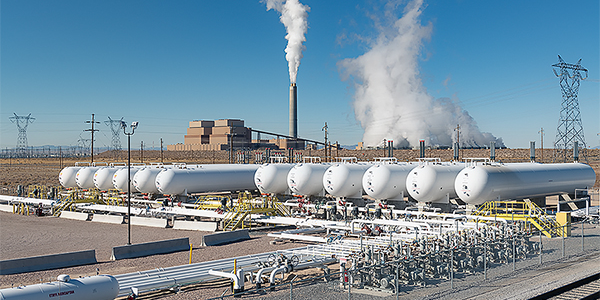Introduction
Propane stands as a resourceful and efficient energy source, catering to various needs in residential and industrial projects. As the world looks for various alternate energy options, understanding how propane is sourced, processed, and delivered becomes important. This blog discusses the process of manufacturing propane, from extraction to delivery, and highlights its benefits. Let’s see how propane is made.
What is Propane?
Propane is a colorless and odorless hydrocarbon gas. Its chemical formula is C3H8, and it consists of carbon and hydrogen resulting in it being a highly combustible and efficient heat source. It is a byproduct formed from two processes: natural gas processing and crude oil refining. Propane is chosen by homeowners and industries due to its clean-burning property and efficiency. Often stored in tanks and cylinders, this gas finds applications in residential, commercial, and industrial settings. It offers a reliable energy source for heating, cooking, and powering automobiles.
Propane Production from Natural Gas
Natural gas processing serves as one of the primary ways for propane extraction. As natural gas is harvested from underground reservoirs, it undergoes a series of steps to separate its components. To isolate natural gas and propane, the process of fractional distillation is performed. During this process, propane and other hydrocarbons like butane and ethane, are extracted from the raw natural gas stream. Once separated, propane undergoes further purification to meet quality standards before being stored. Propane is stored in tanks in liquid form as it is denser in liquid state than gas.
Propane Production from Crude Oil
On the other hand, crude oil refining is another way to produce propane. Through the process of distillation, crude oil is filtered into different fractions according to their boiling points. Lighter components vaporize at lower temperatures while heavier components vaporize at high temperatures. Propane is a lighter hydrocarbon, so it evaporates and turns into gas at lower temperatures. This method helps in extracting propane which then undergoes other processes for purification to meet the needs of consumers.
Why is Propane a Good Choice?
Unlike traditional fuels, propane burns cleanly with lower emissions of harmful gases and pollutants. This leads to better air quality and reduces the carbon footprint. Its efficient combustion also results in cost savings and enhanced energy efficiency, making it an economical option for households and businesses.
In addition to being eco-friendly, propane is convenient and reliable. You can search for “propane delivery near me” or “propane tanks for sale” to find a reputable propane company. With propane companies operating locally, consumers can easily access propane tanks, cylinders, and equipment to meet their needs. Whether it’s a large 500-gallon propane tank for commercial tasks or a 100-lb propane tank for outdoor grilling, suppliers have a variety of propane tanks and appliances,
Propane is an excellent fuel option as it burns hotter and requires less fuel to complete tasks, making it more economical. Portable propane equipment has made outdoor activities easier and more fun. From commercial propane delivery for industrial applications to residential propane exchange services, propane suppliers use advanced logistics and distribution networks to ensure timely and efficient delivery of propane gas to customers’ doorsteps.
Conclusion
The question “how propane gas is made” has now been answered so the curiosity ends here. Propane emerges as a cleaner alternate energy source in comparison to conventional options. It offers a combination of efficiency, reliability, and sustainability. From its extraction process to its delivery to homes and businesses, propane’s significance increases as a versatile and eco-friendly fuel option. It is important to consider sustainable practices, so propane is a great choice for your home and business activities.


